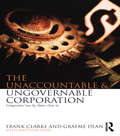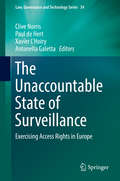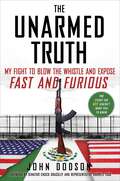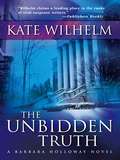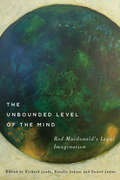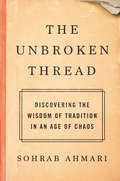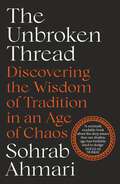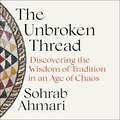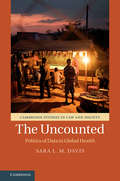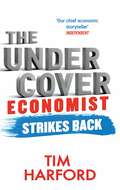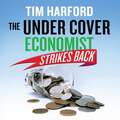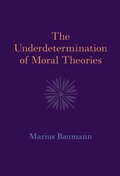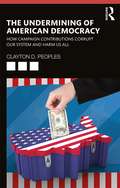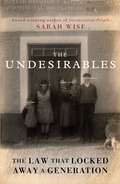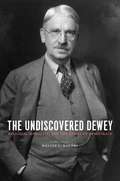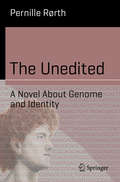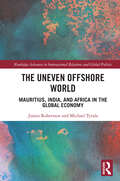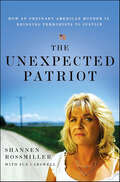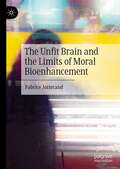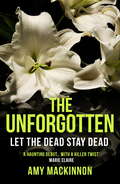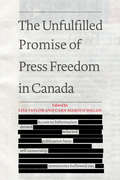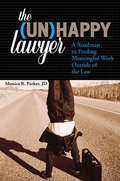- Table View
- List View
The Unaccountable & Ungovernable Corporation: Companies' use-by-dates close in
by Frank Clarke Graeme Dean Matthew EganThe Corporation is a major vehicle of business activity worldwide. It incurs social costs and generates benefits that continually change - hence, whether it still provides a net benefit to society is contestable. Evidence-based observations of the last decade of corporate sagas and the role of accounting and auditing, suggests a serious rethink is needed about how commerce is pursued and, in particular, whether the current corporate form has passed its use-by-date. The authors of this new book - including internationally renowned accounting scholars - argue that the two major governance tools of accounting and auditing require major makeovers. Beginning by analyzing the global sweep of deregulation that corporations experienced since 2000, the authors go on to discuss the various scandals and crises that characterized the subsequent period, culminating in yet more calls for further deregulation. Having thoroughly assessed the status quo, they provide a series of urgent recommendations for reforms designed to bring the corporation back to the real world and restore its purpose. This book will be of great interest to students and academics across accounting, business, law and finance, especially more advanced students at undergraduate and postgraduate level.
The Unaccountable State of Surveillance
by Paul De Hert Clive Norris Xavier L’hoiry Antonella GalettaThis book examines the ability of citizens across ten European countries to exercise their democratic rights to access their personal data. It presents a socio-legal research project, with the researchers acting as citizens, or data subjects, and using ethnographic data collection methods. The research presented here evidences a myriad of strategies and discourses employed by a range of public and private sector organizations as they obstruct and restrict citizens' attempts to exercise their informational rights. The book also provides an up-to-date legal analysis of legal frameworks across Europe concerning access rights and makes several policy recommendations in the area of informational rights. It provides a unique and unparalleled study of the law in action which uncovered the obstacles that citizens encounter if they try to find out what personal data public and private sector organisations collect and store about them, how they process it, and with whom they share it. These are simple questions to ask, and the right to do so is enshrined in law, but getting answers to these questions was met by a raft of strategies which effectively denied citizens their rights. The book documents in rich ethnographic detail the manner in which these discourses of denial played out in the ten countries involved, and explores in depth the implications for policy and regulatory reform.
The Unarmed Truth: My Fight to Blow the Whistle and Expose Fast and Furious
by John DodsonA hard-hitting inside account of the Fast and Furious scandal—the government-sponsored program intended to “win the drug war” by providing and tracking gun sales across the border to Mexico—from whistle-blower and ATF agent John Dodson.After the terror attacks of September 11, 2001, John Dodson pulled bodies out of the wreckage at the Pentagon. In 2007, following the shooting massacre at Virginia Tech, John Dodson walked through the classrooms, heartbroken, to cover up the bodies of the victims. Then came Arizona. The American border. Ten days before Christmas, 2010, ATF agent John Dodson awoke to the news he had dreaded every day as a member of the elite team called the Group VII Strike Force: a U.S. border patrol agent named Brian Terry had been shot dead by bandits armed with guns that had been supplied to them by ATF. Was this an inevitable consequence of the Obama administration’s Project Gunrunner, set in place one year earlier ostensibly to track Mexican drug cartels? Brian Terry’s murder would not only change John Dodson’s life forever; it would reveal a scandal so unthinkably unpatriotic that it forced President Barack Obama to claim executive privilege and caused Attorney General Eric Holder to be held in contempt of Congress. Federal Agent John Dodson, an ex-military man, took an oath to defend the world’s greatest country, and proudly considered himself a walking patriotic example of the American Dream. Brian Terry, ex-military like Dodson, was only forty years old, a family man who served his country by working for the government. Dodson was terrified when the next phone call came, one with the potential to destroy his career, his family, and his life. CBS investigative journalist Sharyl Attkisson asked Dodson to go public with what he knew about Fast and Furious. To Agent Dodson, this meant blowing the whistle. But to the family of Agent Terry, it was a chance to save lives and right a wrong. As he took a fight from the border towns of Arizona to a showdown in the halls of Congress, John Dodson clung to the hope that truth would prevail, that he would be redeemed, and that Brian Terry’s death would not be in vain. Like whistle-blowers before him, John would not be welcome back on the job. But he found strength in his conscience, in the support of the American public, and in Senators Darryl Issa and Chuck Grassley. When his first-amendment rights to publicly tell his story were threatened, the ACLU took up his case. For her report revealing John Dodson as the key whistle-blower in Fast and Furious, Sharyl Attkisson received an Emmy Award for Outstanding Investigative Journalism. Ultimately, John Dodson was cleared by the Inspector General’s office, publicly heralded as a hero, and returned to Arizona. Perhaps a lesson gleaned from John Dodson’s powerful account is well stated by former Speaker of the House of Representatives Sam Rayburn: “If you always tell the truth, you don’t have to remember what you said.”
The Unbidden Truth
by Kate WilhelmOregon lawyer Barbara Holloway has a reputation for taking on the most difficult cases--and winning them. But even she can't begin to anticipate the bizarre twists waiting ahead.The large retainer offered by a client who asks for complete anonymity is not the only thing that intrigues Barbara Holloway. The defendant, Carol Fredricks, is a gifted young pianist charged with killing the manager of a piano bar. But Carol is as much of a mystery as the details of the murder for which she is accused. She can't remember anything about her life before the age of eight, and she has been having haunting nightmares about a woman she cannot identify.Before long Barbara becomes convinced that her client is not only innocent, but is being framed by an enemy who will stop at nothing to keep the past buried. And as she unravels the stunning trail of deception, hatred and a remarkable abiding love that holds the key to the mystery of Carol Fredricks, Barbara discovers that the unbidden truth may just damn them both.
The Unbounded Level of the Mind
by Rosalie Jukier Richard Janda Daniel JutrasRoderick A. Macdonald (1948-2014), internationally renowned for his expertise on access to justice, legal pluralism, and the philosophy of law, was first and foremost a teacher and mentor. He believed in the law as a promise our society makes to itself, and passionately imparted this message to students who went on to become lawyers, judges, and academics. Throughout his career, including participation in several government commissions and tenures as dean of law at McGill University and president of the Law Commission of Canada, he strove to promote ideas that have become woven into our contemporary understanding of unity, reconciliation, accommodation, and social justice. The Unbounded Level of the Mind brings together the fascinating essays developed from presentations made at a symposium, held in February 2014 at McGill's Faculty of Law, in honour of Rod Macdonald. Eminent legal scholars from Canada and beyond explore various aspects of Macdonald's rich scholarship, reflecting on the influence this has had on their own work and its implications for the future. Organized around six cross-cutting themes - kaleidoscopic federalism, producing fairness, pluralizing the subject, the priority of distributive justice, contextualizing governance, and pursuing virtue - this volume is both a tribute to Macdonald's dedication to the law and a call to challenge all assumptions in the quest to better our society.
The Unbounded Level of the Mind: Rod Macdonald's Legal Imagination
by Rosalie Jukier Richard Janda Daniel JutrasRoderick A. Macdonald (1948-2014), internationally renowned for his expertise on access to justice, legal pluralism, and the philosophy of law, was first and foremost a teacher and mentor. He believed in the law as a promise our society makes to itself, and passionately imparted this message to students who went on to become lawyers, judges, and academics. Throughout his career, including participation in several government commissions and tenures as dean of law at McGill University and president of the Law Commission of Canada, he strove to promote ideas that have become woven into our contemporary understanding of unity, reconciliation, accommodation, and social justice. The Unbounded Level of the Mind brings together the fascinating essays developed from presentations made at a symposium, held in February 2014 at McGill’s Faculty of Law, in honour of Rod Macdonald. Eminent legal scholars from Canada and beyond explore various aspects of Macdonald’s rich scholarship, reflecting on the influence this has had on their own work and its implications for the future. Organized around six cross-cutting themes – kaleidoscopic federalism, producing fairness, pluralizing the subject, the priority of distributive justice, contextualizing governance, and pursuing virtue – this volume is both a tribute to Macdonald’s dedication to the law and a call to challenge all assumptions in the quest to better our society.
The Unbroken Thread: Discovering the Wisdom of Tradition in an Age of Chaos
by Sohrab AhmariWe&’ve pursued and achieved the modern dream of defining ourselves—but at what cost? The New York Post op-ed editor makes a compelling case for seeking the inherited traditions and ideals that give our lives meaning.&“Ahmari&’s tour de force makes tradition astonishingly vivid and relevant for the here and now.&”—Rod Dreher, bestselling author of Live Not by Lies and The Benedict OptionAs a young father and a self-proclaimed &“radically assimilated immigrant,&” opinion editor Sohrab Ahmari realized that when it comes to shaping his young son&’s moral fiber, today&’s America comes up short. For millennia, the world&’s great ethical and religious traditions taught that true happiness lies in pursuing virtue and accepting limits. But now, unbound from these stubborn traditions, we are free to choose whichever way of life we think is most optimal—or, more often than not, merely the easiest. All that remains are the fickle desires that a wealthy, technologically advanced society is equipped to fulfill.The result is a society riven by deep conflict and individual lives that, for all their apparent freedom, are marked by alienation and stark unhappiness.In response to this crisis, Ahmari offers twelve questions for us to grapple with—twelve timeless, fundamental queries that challenge our modern certainties. Among them: Is God reasonable? What is freedom for? What do we owe our parents, our bodies, one another? Exploring each question through the life and ideas of great thinkers, from Saint Augustine to Howard Thurman and from Abraham Joshua Heschel to Andrea Dworkin, Ahmari invites us to examine the hidden assumptions that drive our behavior and, in so doing, to live more humanely in a world that has lost its way.
The Unbroken Thread: Discovering the Wisdom of Tradition in an Age of Chaos
by Sohrab Ahmari'A serious - and seriously readable - book about the deep issues that our shallow age has foolishly tried to dodge' - Douglas Murray 'A crystal-clear analysis of the multiple failures of "me-first" contemporary liberalism' - Giles FraserFor millennia, philosophical, ethical and theological reflection was commonplace among the intellectually curious. But the wisdom that some of the greatest minds across the centuries continue to offer us remains routinely ignored in our modern pursuit of self-fulfilment, economic growth and technological advancement. Sohrab Ahmari, the influential Op-Ed editor at the New York Post, offers a brilliant examination of our postmodern Western culture, and an analysis of the paradox at its heart: that the 'freedoms' we enjoy - to be or do whatever we want, subject only to consent, with everything morally neutral or relative - are at odds with the true freedom that comes from the pursuit of the collective good. Rather than the insatiable drive to satisfy our individual appetites, this collective good involves self-sacrifice and self-control. It requires us to diminish so that others may grow. What responsibility do we have to our parents? Should we think for ourselves? Are sexual ethics purely a private matter? How do we justify our lives? These, and other questions - explored in the company of a surprising range of ancient and contemporary thinkers - reveal how some of the most ancient moral problems are as fresh and relevant to our age as they were to our ancestors.By plumbing the depths of each question, the book underscores the poverty of our contemporary narratives around race, gender, privilege (and much else), exposing them as symptoms of a deep cultural crisis in which we claim a false superiority over the past, and helps us work our way back to tradition, to grasp at the thin, bare threads in our hands, while we still can.
The Unbroken Thread: Discovering the Wisdom of Tradition in an Age of Chaos
by Sohrab AhmariSohrab Ahmari challenges the postmodern Western worldview by asking 12 timeless, fundamental questions about life - and reveals that true freedom and happiness is found in the wisdom of traditional thought.We've pursued and achieved the modern dream of defining ourselves - but at what cost? The influential New York Post op-ed editor makes a compelling case for the modern person to seek the inherited traditions and ideals that give our lives meaning.As a young father and a self-proclaimed 'radically assimilated immigrant' opinion editor Sohrab Ahmari realised that when it comes to morals and principles he'd want his son to inherit, today's America comes up short. For millennia, the world's great moral and religious traditions taught that true happiness lies in pursuing virtue - and accepting limits. But now, free from these stubborn traditions, we all exercise some degree of liberty to live the way we think is most optimal - or, more often than not, merely the easiest. All that remains are the fickle desires that a wealthy, technologically advanced society is equipped to fulfill.In response to this crisis, Ahmari offers twelve questions for us to grapple with - twelve timeless, fundamental queries that challenge our modern certainties. Among them: Is God reasonable? What is freedom? What do we owe our parents, our bodies, each other? Drawing on historical and contemporary figures from Saint Augustine to Howard Thurman to Abraham Joshua Heschel, he invites us to consider the hidden beliefs that drive our behaviour, and in so doing, recapture a more human way of living in a world that has lost its way.(P) 2021 Penguin Audio
The Uncounted: Politics of Data in Global Health (Cambridge Studies in Law and Society)
by Sara L.M. DavisIn the global race to reach the end of AIDS, why is the world slipping off track? The answer has to do with stigma, money, and data. Global funding for AIDS response is declining. Tough choices must be made: some people will win and some will lose. Global aid agencies and governments use health data to make these choices. While aid agencies prioritize a shrinking list of countries, many governments deny that sex workers, men who have sex with men, drug users, and transgender people exist. Since no data is gathered about their needs, life-saving services are not funded, and the lack of data reinforces the denial. The Uncounted cracks open this and other data paradoxes through interviews with global health leaders and activists, ethnographic research, analysis of gaps in mathematical models, and the author's experience as an activist and senior official. It shows what is counted, what is not, and why empowering communities to gather their own data could be key to ending AIDS.
The Undercover Economist Strikes Back: How to Run or Ruin an Economy
by Tim HarfordA million readers bought The Undercover Economist to get the lowdown on how economics works on a small scale, in our everyday lives. Since then, economics has become big news. Crises, austerity, riots, bonuses - all are in the headlines all the time. But how does this large-scale economic world really work? What would happen if we cancelled everyone's debt? How do you create a job? Will the BRIC countries take over the world? Asking - among many other things -- what the future holds for the Euro, why the banks are still paying record bonuses and where government borrowing will take us, in The Undercover Economist Strikes Back, Tim Harford returns with his trademark clarity and wit to explain what's really going on - and what it means for us all.
The Undercover Economist Strikes Back: How to Run or Ruin an Economy
by Tim HarfordA million readers bought The Undercover Economist to get the lowdown on how economics works on a small scale, in our everyday lives. Since then, economics has become big news. Crises, austerity, riots, bonuses - all are in the headlines all the time. But how does this large-scale economic world really work? What would happen if we cancelled everyone's debt? How do you create a job? Will the BRIC countries take over the world? Asking - among many other things -- what the future holds for the Euro, why the banks are still paying record bonuses and where government borrowing will take us, in The Undercover Economist Strikes Back, Tim Harford returns with his trademark clarity and wit to explain what's really going on - and what it means for us all.
The Underdetermination of Moral Theories
by Marius BaumannIn normative ethics, a small number of moral theories, such as Kantianism or consequentialism, take centre stage. Conventional wisdom has it that these individual theories posit very different ways of looking at the world. In this book Marius Baumann develops the idea that just as scientific theories can be underdetermined by data, so can moral theories be underdetermined by our considered judgments about particular cases. Baumann goes on to ask whether moral theories from different traditions might arrive at the same verdicts while remaining explanatorily incompatible. He applies this idea to recent projects in normative ethics, such as Derek Parfit's On What Matters and so-called consequentializing and deontologizing, and outlines its important implications for our understanding of the relationship between the main moral traditions as well as the moral realism debate. This title is also available as Open Access on Cambridge Core.
The Undermining of American Democracy: How Campaign Contributions Corrupt our System and Harm Us All
by Clayton D. PeoplesThe public believes that politicians in the US favor special interests over their constituents and that our political institutions have become corrupt—and they are right. A growing body of evidence shows that special interests have disproportionate sway over policy via campaign contributions and lobbying. In this book, the author presents this evidence in a logical, understandable way; he then illustrates how campaign contributions harm our economy, exacerbate inequality, and undermine our democracy. One of the most startling findings of the book is that campaign contributions led to the Financial Crisis and Great Recession. The author concludes that campaign contributions have effectively created an oligarchy in the US, and, thus, reform is needed to save our democracy. The final chapter of the book suggests a number of different reforms that could be pursued—and highlights some ways in which these reforms can be achieved.
The Undesirables: The Law that Locked Away a Generation
by Sarah WiseThrough the early twentieth century, the British Government locked away over 50,000 innocent people. Their &‘crimes&’? Being poor and unyielding. This is their story. 'The heartrending stories Sarah Wise has unearthed beggar belief… beautifully researched and truly compelling.' Catherine Bailey, author of Black Diamonds By 1950, an estimated 50,000 people had been deemed &‘defective&’ by the British government and detained indefinitely under the 1913 Mental Deficiency Act. Their &‘crimes&’ were various: women with children born out of wedlock; rebellious teenagers caught shoplifting; those with epilepsy, hearing impairments and chronic illnesses who had struggled in school; and many who were simply &‘different&’. Forcibly removed from their families and confined to a shadow world of specialist facilities in the countryside, they were hidden away and forgotten – out of sight, out of mind. Through painstaking archival research, award-winning historian Sarah Wise shines a light on this shameful chapter. Piecing together the lives irrevocably changed by this devastating legislation, The Undesirables provides a compelling study of how early twentieth-century attitudes to class, gender and disability resulted in a nationwide scandal – and how they continue to shape social policy to this day.
The Undiscovered Dewey: Religion, Morality, and the Ethos of Democracy
by Melvin RogersThe Undiscovered Dewey explores the profound influence of evolution and its corresponding ideas of contingency and uncertainty on John Dewey's philosophy of action, particularly its argument that inquiry proceeds from the uncertainty of human activity. Dewey separated the meaningfulness of inquiry from a larger metaphysical story concerning the certainty of human progress. He then connected this thread to the way in which our reflective capacities aid us in improving our lives. Dewey therefore launched a new understanding of the modern self that encouraged intervention in social and natural environments but which nonetheless demanded courage and humility because of the intimate relationship between action and uncertainty. Melvin L. Rogers explicitly connects Dewey's theory of inquiry to his religious, moral, and political philosophy. He argues that, contrary to common belief, Dewey sought a place for religious commitment within a democratic society sensitive to modern pluralism. Against those who regard Dewey as indifferent to moral conflict, Rogers points to Dewey's appreciation for the incommensurability of our ethical commitments. His deep respect for modern pluralism, argues Rogers, led Dewey to articulate a negotiation between experts and the public so that power did not lapse into domination. Exhibiting an abiding faith in the reflective and contestable character of inquiry, Dewey strongly engaged with the complexity of our religious, moral, and political lives.
The Unedited: A Novel About Genome and Identity (Science and Fiction)
by Pernille RørthThis novel is set in the near future, where human genome editing has become routine. First adopted to fight a lethal virus, it is now widely used to prevent diseases and favor other traits. Ben, Eiko, Celia, Raphael and Leo have just had their coming-of-age genome reading and are struggling with this new information for each their own reasons. Soon, they are cast into the middle of a crisis that threatens the future of their society and pits it against a parallel, but strictly separated, society where genome manipulation is forbidden on religious grounds. The book includes an essay on the potential of human genome engineering and related genome-based choices.
The Uneven Offshore World: Mauritius, India, and Africa in the Global Economy (Routledge Advances in International Relations and Global Politics)
by Justin Robertson Michael TyralaInformed by world-systems analysis, this book examines the shifting patterns of accommodation and resistance to the offshore world, with a particular focus on Mauritius as a critical but underappreciated offshore node mediating foreign investment into India and Africa. Drawing on a large pool of financial data and elite interviews, the authors present the first detailed comparative study of the Mauritius–India and Mauritius–Africa offshore relationships. These relationships serve as indicative test cases of the contemporary global tax reform agenda and its promise to rein in offshore finance. Whereas India’s economic power and multilateral track record have enabled it to actively shape this agenda and implement it in a robust manner, most African countries have found themselves either unable to meet its stringent criteria or unwilling to do so out of fear that it might discourage investment. Its impact on offshore financial centers has likewise been limited. A few of the least sophisticated ones appear to have fallen by the wayside, but the rest have either remained largely unaffected, or, like Mauritius, succeeded in consolidating their operations and surviving the current round of regulatory headwinds. The findings suggest that the contemporary global tax reform agenda has thus far not only failed to make good on its promise but also actually reinforced numerous existing power hierarchies. The Uneven Offshore World is written in an accessible style and aimed at readers without specialized knowledge of tax issues.
The Unexpected Patriot: How an Ordinary American Mother Is Bringing Terrorists to Justice
by Sue Carswell Shannen RossmillerAfter 9/11, when the nation was still in shock over the unprecedented attack on U.S. soil, Shannen Rossmiller, a country judge and mother of three in rural Montana, was formulating a plan. Soon she was devouring literature on Islamic culture, teaching herself Arabic, and preparing to infiltrate the central nervous system of global terror: online networks. Her efforts succeeded beyond imagination. Posing as an Islamic terrorist under dozens of screen aliases, she joined forces with the FBI and started trolling jihadist chat rooms, striking up conversations at 3am with men as far away as Pakistan, and amassing evidence against an array of suspected terrorists both at home and abroad. Her work laid the foundation for the online searches so crucial to law enforcement's fight against terror today. Shannen's husband, Randy, uncovered her double life after a chat room terrorist wiped out the family computer and reports rolled in that the Rossmillers were being targeted for reprisal. Undeterred, Shannen started working with the FBI on sting operations, involving everything from jihadist cells to weapons caches to bomb plots, and bringing many of her targets to justice, as well as pioneering the digital entrapment tactics that are at the forefront of today's war on terror. This is the story of one woman's unexpected courage and how it changed the face of this global struggle.
The Unexpected Scalia
by David M. DorsenAntonin Scalia was one of the most important, outspoken, and controversial Justices in the past century. His endorsements of originalism, which requires deciding cases as they would have been decided in 1789, and textualism, which limits judges in what they could consider in interpreting text, caused major changes in the way the Supreme Court decides cases. He was a leader in opposing abortion, the right to die, affirmative action, and mandated equality for gays and lesbians, and was for virtually untrammelled gun rights, political expenditures, and the imposition of the death penalty. However, he usually followed where his doctrine would take him, leading him to write many liberal opinions. A close friend of Scalia, David Dorsen explains the flawed judicial philosophy of one of the most important Supreme Court Justices of the past century.
The Unfit Brain and the Limits of Moral Bioenhancement
by Fabrice JotterandIn light of the potential novel applications of neurotechnologies in psychiatry and the current debate on moral bioenhancement, this book outlines the reasons why more conceptual work is needed to inform the scientific and medical community, and society at large, about the implications of moral bioenhancement before a possible, highly hypothetical at this point, broad acceptance, and potential implementation in areas such as psychiatry (e.g., treatment of psychopathy), or as a measure to prevent crime in society. The author does not negate the possibility of altering or manipulating moral behavior through technological means. Rather he argues that the scope of interventions is limited because the various options available to “enhance morality” improve, or simply manipulate, some elements of moral behavior and not the moral agent per se in the various elements constitutive of moral agency. The concept of Identity Integrity is suggested as a potential framework for a responsible use of neurotechnologies in psychiatry to avoid human beings becoming orderers and orderables of technological manipulations.
The Unforgotten: The gripping and heartbreaking thriller full of twists and long-held secrets
by Amy MacKinnon'HAUNTING AND MULTILAYERED WITH A KILLER TWIST' - Marie Claire'If you like emotional, gripping crime fiction then you'll love this book' - Amazon reviewer'This is a beautifully written atmospheric mystery that immerses the reader in the life, work and rituals at a funeral parlour.' - Amazon reviewer*******Let the dead stay dead.Clara Marsh is an undertaker. She spends her solitary life among the dead and bids them farewell with a bouquet from her own garden. But Clara's carefully structured life shifts when she discovers a neglected little girl, Trecie, playing in the funeral parlour, desperate for a friend. It changes even more when Detective Mike Sullivan starts questioning her again about a body she prepared three years ago, an unidentified girl found murdered in a nearby strip of woods. Unclaimed by family, the community christened her Precious Doe. When Clara and Mike learn that Trecie may be involved with the same people who killed Precious Doe, Clara must choose between her solitary but steadfast existence and the perils of binding one's life to another. Clara's search for the girl pulls her into a spiralling series of events that threaten to endanger the few people Clara has grown to love - and finally brings her own tragic and long-buried past to the surface.'Such a refreshing read... I've not read anything like it before' - Amazon reviewer'an hypnotic debut... There's a quiet, almost stealthy quality to the writing...Clara is an astonishing character, and with language as blunt as the death she sees every day, she expresses herself with devastating simplicity.' -New York Times Book Review*******PREVIOUSLY PUBLISHED AS TETHERED
The Unfulfilled Promise of Press Freedom in Canada
by Lisa Taylor Cara-Marie O'HaganCanadian news reports are riddled with accounts of Access to Information requests denied and government reports released with large swaths of content redacted. The Unfulfilled Promise of Press Freedom in Canada offers a vast array of viewpoints that critically analyze the application and interpretation of press freedom under the Charter of Rights. This collection, assiduously put together by editors Lisa Taylor and Cara-Marie O’Hagan, showcases the insights of leading authorities in law, journalism, and academia as well as broadcasters and public servants. The contributors explore the ways in which press freedom has been constrained by outside forces, like governmental interference, threats of libel suits, and financial constraints. These intersectional and multifaceted lines of inquiry provide the reader with a 360-degree assessment of press freedom in Canada while discouraging complacency among Canadian citizens. After all, an informed citizenry is a free citizenry.
The Unhappy Lawyer: A Roadmap to Finding Meaningful Work Outside of the Law
by Monica R. ParkerThe Unhappy Lawyer will help you uncover exciting alternative careers with a unique step-by-step program that will make you feel like you have your very own career coach. With chapters containing real letters from lawyers who are desperate to leave the practice of law, tales from lawyers who have shut the door on their legal careers, and powerful exercises, The Unhappy Lawyer provides a witty, no-nonsense roadmap for finding and pursuing engaging work outside of the law.
The Unheard: A Novel
by Nicci French&‘He did kill. Kill and kill and kill.&’ Tess&’s number one priority has always been her three-year-old daughter Poppy. But splitting up with Poppy&’s father Jason means that she cannot always be there to keep her daughter safe. When she finds a disturbing drawing, dark and menacing, among her daughter&’s brightly coloured paintings, Tess is convinced that Poppy has witnessed something terrible. Something that her young mind is struggling to put into words. But no one will listen. It&’s only a child&’s drawing, isn&’t it? Tess will protect Poppy, whatever the price. But when she doesn&’t know what, or who, she is protecting her from, how can she possibly know who to trust . . . ? 'Confirms Nicci French as the giant of the genre' Erin Kelly &‘An intense, brilliantly crafted thriller that hums with menace from start to finish' TM Logan Praise for Nicci French: &‘Expertly paced, psychologically sharp, thoroughly enjoyable' Louise Candlish &‘Meticulously plotted, psychologically astute&’ Sarah Vaughan 'A heart-wrenchingly plausible spiral into paranoia, fear and unbearable tension. Literally pulse-pounding' Christopher Brookmyre 'Totally absorbing. Such great plotting and characters, but also so human and full of insights about ordinary life and relationships. That's what always sets Nicci French&’s work apart - it makes the narrative feel so real' Sabine Durrant 'I love Nicci French&’s books, and with The Unheard they are right at the top of their game. Few crime writers can match their psychological acuity, of their ability to lead a reader through dizzying plot twists without ever losing pace. It&’s an absolute masterclass of crime writing' Kate Rhodes &‘Great writing, razor-sharp plotting, and powerful characterisation. I was 100 pages in before I even drew breath, and I defy anyone to see the ending coming&’ Cara Hunter &‘It&’s Nicci French perfection – which, as we all know, is the best kind of perfection. So, so gripping and brilliantly clued' Sophie Hannah &‘What an intriguing, compelling page-turner. I ate it up in two days&’ Liz Nugent 'The Unheard is elegant and beguiling, masterfully crafted, with an almost hallucinatory sense of jangling unease' C. M. Ewan &’Taut, well-paced and frighteningly familiar, I found it difficult to put down and hard to forget' Polly Phillips
